For weeks, Sergio Romo told anyone who would listen that he wasn’t sure if he was big enough for the moment.
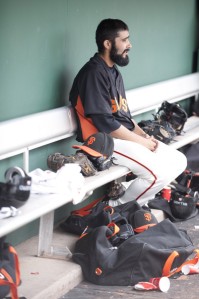
Turns out, the moment wasn’t nearly big enough for him.
With the 2012 World Series on the line, the exuberant, eyelash of a relief pitcher for the San Francisco Giants needed one more strike to bring a championship title to his team. However, he needed to push that final pitch past the most intimidating hitter on the planet, Detroit’s Miguel Cabrera – the first player in 45 years to win a Triple Crown.
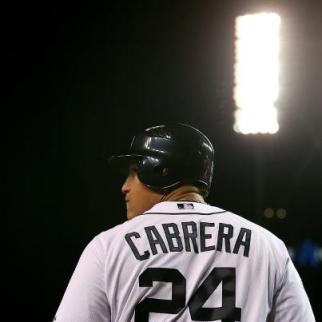
After teasing Cabrera with a procession of sliders bending like elbows of macaroni, Romo summoned his resolve – and all 170 pounds of his lean body mass – and threw a fastball on the inner half of the plate. It was a pitch that barreled into the most dangerous part of a right-handed power hitter’s swing – precisely the kind of pitch an accomplished slugger like Cabrera routinely turned into loud headlines.
Under the circumstances, though, it may have been the last thing in the world Cabrera expected to see from his whipcord-thin adversary. So, Romo threw it – threw it with the cool of a safecracker and the conviction of a drill sergeant.

The most vulnerable pitch in the game went directly into the teeth of the most dangerous swing in the sport…and went completely untouched. Cabrera’s bat never moved – as if rusted to his beefy shoulder – and Romo’s iron nerves were rewarded with a happy mob of teammates racing each other to reach their self-effacing savior.

In the end, the moments – and there were plenty of them during an inexplicably magical season – were never too big for any of them. The 2012 San Francisco Giants answered every critic, cleared every hurdle, and conquered every doubt on their way to a second World Series triumph in three years. And they did so with the kind of unshakeable resolve and affable unity representing the truest qualities of the team concept.
A Major League roster contains twenty-five players, and the Giants used every last one of them to find ways to win often enough and timely enough to push past every other team in the sport. Each player left a distinct set of fingerprints on the championship season – twenty-five pairs of hands helping to lift the World Series trophy and carry it back to San Francisco.
And they came from everywhere, landing on the Giants’ roster as if carried by a serendipitous tide.

They came from Dotham, Alabama – like Matt Cain, the sturdy starting pitcher who opened the All-Star Game less than a month after throwing the first perfect game in franchise history. In the playoffs, the Giants relied on him to propel them forward in the deciding game of each round, which he did dutifully and doggedly, somehow squashing the pressure of the moment to answer the call every time.

They came from San Felipe, Venezuela – like Marco Scutaro, who started the year with the Colorado Rockies, his fifth team in eleven big league seasons, and drifted to the Giants at the trade deadline in a deal that barely registered amidst higher profile swaps. But the veteran second baseman wasted little time in being noticed. For a player who spent his entire career doing everything well but nothing great, Scutaro was spectacular from the moment he put on a San Francisco uniform. In 61 games with the Giants, he hit .362. And he carried his torrid hitting into the playoffs, peppering St. Louis with 14 hits over seven games of the National League Championship Series – a journeyman who finally found purpose in the journey.

They also came from nearby Carabobo, Venezuela – like Pablo Sandoval, San Francisco’s cherubic third baseman, whose unlikely agility earned him the affectionate nickname, “King Fu Panda.” Moreover, Sandoval’s endearing naiveté and buoyant personality brought smiles to fans and teammates all season.

But he was more than just a source of cheerfulness. His slashing, unpredictable approach at the plate produced moments of wonder – none bigger than the three thunderous home runs he hit in the opening game of the World Series en route to being named MVP of the Fall Classic.

They came from Atglen, Pennsylvania – llike Ryan Vogelsong, who pitched across three continents and through major arm surgery to get one last shot in the big leagues. At 35, he didn’t waste it, either. Starting three of the biggest games of his life for the Giants in the playoffs, Vogelsong was superb in each. And San Francisco won them all – in Cincinnati with elimination looming, in San Francisco against the Cardinals with the season again on the line, and in Detroit with a title inching closer. Through it all, Vogelsong allowed just three runs in over 24 innings of work.

They came from Leesburg, Georgia – like Buster Posey, the team’s phenomenal young catcher who missed nearly all of the 2011 season with a horrific ankle injury but came thundering back with a likely MVP year in 2012. Despite having less than three years of big league experience, Posey’s remarkable poise and knowledge of the game commanded respect in the locker room and on the field. Behind the plate, his extraordinary insight into pitch selection earned the unwavering confidence of a pitching staff that excelled when the stakes were greatest. He was also the anchor on offense, the hitter opposing teams justifiably feared the most in the Giants’ lineup. His grand slam off of Mat Latos in the deciding game against Cincinnati provided San Francisco’s final margin of victory in that playoff round and was one of the biggest swings of the bat in the entire postseason.

They came from Las Vegas, Nevada – like Barry Zito, who signed one of baseball’s biggest contracts in 2007 but had delivered a litany of disappointment and misery from the mound ever since. In fact, Zito’s San Francisco legacy deteriorated to such low ebb that his name alone prompted derision and bitterness from fans.

So, when he took the mound against the Cardinals in the league championship series and with the Giants needing to win yet again to stay alive, few believed Zito could save them. But he did. He pitched brilliantly, shutting St. Louis out for almost eight innings – nearly restoring his reputation in one magical night. As if to finish the restoration job, Zito outpitched Detroit’s fire-breathing ace Justin Verlander in Game One of the World Series, an 8-3 San Francisco victory.

They came from Fort Worth, Texas – like Hunter Pence, a gangly but powerful outfielder who, like Marco Scutaro, arrived in San Francisco at the trade deadline. But unlike Scutaro, Pence came to the team with sizeable expectations and initially struggled to meet any of them. Although he did produce enough timely hits to drive in 45 runs in 59 regular season games for the Giants, his true impact came right before a playoff game in Cincinnati. After losing two important games to the Reds, Pence tried to rally his deflated teammates. With evangelical zeal, he implored that “no matter what happens we must not give in. We owe it to each other, play for each other. I need one more day with you guys.” His fiery plea turned out to be the rallying point they needed to push past Cincinnati and keep tomorrows appearing on their postseason calendar all the way through the World Series.

They came from Renton, Washington – like Tim Lincecum, the Giants’ unorthodox star pitcher who parlayed his unusual throwing motion and outstanding ability into consecutive Cy Young awards in 2008 and 2009.

However, in 2012, his remarkable pitching prowess vanished, his struggles magnified by the unexpected nature of the erosion. His velocity dipped, he gave up the most earned runs in the league, and no one could figure out what had gone wrong so quickly. By the time the playoffs rolled around, Lincecum had offered little evidence that his fortunes would improve in the postseason. So, he was sent to the bullpen – baseball Siberia for any starting pitcher, let alone one with his sparkling resume. Rather than complain or sulk, the former trophy-winning starter accepted his demotion as a challenge. Fittingly, he had spent his entire baseball life overcoming them. At 5’11” and 175 pounds, he wasn’t supposed to be a power pitcher. But he was. His unconventional delivery wasn’t supposed to work. But it did. And, now, his postseason banishment to the bullpen was supposed to confirm a slide into mediocrity. But it didn’t. With his shoulder-length hair snapping and his diminutive frame contorting furiously, Lincecum regained his extraordinary pitching form when it mattered most and annihilated hitters in his new role. In 13 postseason innings from the bullpen, he gave up just three hits and struck out 17. Baseball’s biggest rock star was back and had the renewed swagger to prove it.

There were so many key contributors to the Giants’ extraordinary season that the heroics seemed to come in waves, with different players showcasing specific skills just as the team needed them.
Brandon Crawford grew up just a few miles from San Francisco, likely never imagining that he would become the starting shortstop for the team he grew up idolizing. But when he did, his spectacular defense and timely hitting proved to be the necessary anchor for the infield. Pitcher Madison Bumgarner won 16 games – tied with Cain for the team lead – and played with such poise and tenacity that it was easy to forget he had just celebrated his 23rd birthday. Although reliever Jeremy Affeldt recorded so many important outs throughout the year, none were bigger than the five he registered in Game Four of the World Series – cutting right through the heart of Detroit’s fearsome lineup, striking out four of them – including Miguel Cabrera and Prince Fielder. Outfielder Angel Pagan provided much needed speed – leading the team in steals with 29 – at the top of the order and energized the team with his terrific defense and passion for the game.



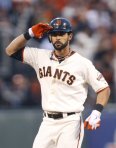
Collectively, the 2012 Giants came back – again and again and again. In fact, they pulled themselves from the edge of oblivion so many times it defied all baseball logic.
In April, the club lost its flamboyant All-Star closer, Brian Wilson, to a season-ending elbow injury but used the remaining relief pitchers in enough variations to finish games until Sergio Romo claimed the job for good late in the season.
In August, one of the team’s best hitters, outfielder Melky Cabrera, was suspended 50 games for violating Major League Baseball’s rule against performance-enhancing drugs. Rather than explaining what he had done and why he had done it, Cabrera simply fled the scene, leaving his teammates to sort through the betrayal on their own.
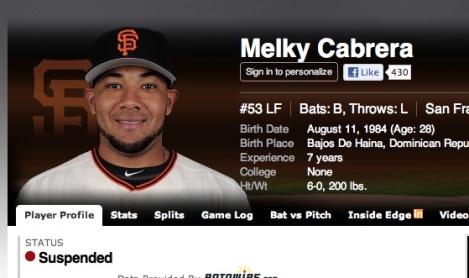
The best way to deal with the duplicity, they decided, was to play even better without him. In the 45 regular season games after Cabrera’s suspension, the Giants won 30 of them.
Ten days after Cabrera abandoned the club, the rival Los Angeles Dodgers acquired perennial slugger Adrian Gonzalez from Boston in a stunning trade that most experts believed would propel the Dodgers to the division title.

Instead, San Francisco rallied to increase its hold on first place from two games to eight, clinching the National League West with over a week to spare.
And in the postseason, their restorative powers were taken to an entirely different realm.
In the first round of the playoffs, the Giants lost the first two games of the best-of-five series to Cincinnati at home. The second defeat, a demoralizing 9-0 blowout, seemed an emphatic stamp by the Reds on their way to a dominant series win. After all, Cincinnati needed only to win one more game in the next three opportunities – all in their own ballpark – to eliminate San Francisco. However, Pence preached, Posey slammed, and Cain was able. The Giants won all three elimination games – all on the road, the first time a playoff team survived such a stretch while living out of suitcases.
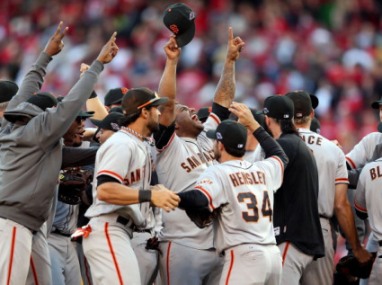
In the best-of-seven National League Championship Series, the Giants once again lost early ground, dropping three of the first four games to St. Louis. Although San Francisco faced the familiar scenario of having to win three straight to advance, the team at least knew if they could win one more game on the road the final two games would take place at home in front of 45,000 of the loudest fans in the sport. Once Zito pitched his way back into the hearts of San Franciscans everywhere, Vogelsong and Cain made sure it mattered by shutting down the Cardinals in front of packed Bay Area houses.
Perhaps, as fitting punctuation, Scutaro caught the final out off the bat of St. Louis outfielder Matt Holliday, the very same player who – earlier in the series – barreled viciously into him nearly mangling the much smaller infielder’s left knee. Moments before the final clinching catch, Scutaro extended his arms out from his sides as far as they would go and tilted his head back as a sudden downpour drenched the field. Literally and figuratively, he soaked in the moment as an impending National League champion and series MVP.

In the end, the Giants had played six games in less than two weeks facing the immediate end of their season – and had won them all.
In a way, the World Series was anti-climatic. Sandoval’s three-homer haymaker and Romo’s gutsy gamesmanship served as bookends to a lopsided Giants’ sweep over the Detroit Tigers. The team that thrived on tension and adversity all season long encountered little of it in the final series of the year.
Of course, San Francisco manager Bruce Bochy probably welcomed the change – his personality better suited for calm and steady. However, whenever the pressure surged or the amalgam of hardship threatened to swallow the team, it was Bochy who soothed them. His even-tempered nature set the tone in the clubhouse and dugout and out on the field, his deep Southern drawl a soundtrack for thoughtful, committed play.

Behind the placid persona, the Giants’ skipper was relentless in preparing and executing his game strategy. When Wilson was injured, Bochy simply rearranged his bullpen until he found a workable combination, all the while getting his veteran relief pitchers to willingly accept new roles.
After Cabrera vanished and the Dodgers fortified, Bochy motivated his team to rely on each other rather than allow others to push them apart. In the playoffs, he trusted Zito and happily accepted the dividends. In the World Series, he used Gregor Blanco in left field primarily for his defense and watched as Blanco made three spectacular catches in crucial situations.
More to the point, the Giants played relentlessly and confidently amidst near-historic pressure, and the manager of the team deserved a goodly portion of praise for the effort.
Perhaps, few embodied that relentless spirit better than the newly-minted closer Romo. Growing up in Brawley, California – a desolate farming town 20 miles from the Mexican border – the Giants’ undersized bullpen lion probably knew better than most how difficult but rewarding defying the odds could be. After all, he rose all the way to the big leagues as a 28th round draft pick largely relying on one pitch – a knee-buckling, gravity-rebelling slider.

Yet, there he was, staring down big, bad Miguel Cabrera in the World Series and then decided to throw him something other than the pitch responsible for getting him to the majors. That kind of extraordinary belief was an utterly perfect way for San Francisco to crown its title run.
The familiar mantra the team had used to stave off elimination in all of those pressure- packed games was that they wanted one more day together, because they simply weren’t ready to go home.
Well, the 2012 San Francisco Giants finally went home – as World Champions.

Sources:
http://www.usatoday.com/story/gameon/2012/10/10/hunter-pence-inspirational-speech/1624633/
http://www.latimes.com/sports/la-sp-1027-sergio-romo-giants-20121027,0,6411058.story?page=1
http://www.tampabay.com/sports/baseball/ml/world-series-shows-san-francisco-giants-bruce-bochy-is-one-of-baseballs/1258999
http://www.sfgate.com/giants/article/When-Cabrera-left-SF-Giants-thrived-3890499.php
http://www.baseball-reference.com/players/s/scutama01.shtml
http://www.baseball-reference.com/players/v/vogelry01.shtml
http://www.baseball-reference.com/players/p/pencehu01.shtml
http://www.baseball-reference.com/players/l/linceti01.shtml
Photos:
http://www.zimbio.com/pictures/VbwMBc7ocln/Arizona+Diamondbacks+v+San+Francisco+Giants/DR7au51xcLN/Sergio+Romo
http://graphics8.nytimes.com/images/2012/10/30/sports/YSCORE/YSCORE-articleLarge.jpg
http://thepinetree.net/images/announce/SergioRomo_ri0afg4s_hxuqbozc.jpg
http://ww4.hdnux.com/photos/14/14/67/3198407/3/628×471.jpg
http://i.cdn.turner.com/si/multimedia/photo_gallery/1010/mlb.unlikely.postseason.heroes/images/marco-scutaro.jpg
http://img.bleacherreport.net/img/images/photos/001/954/992/154682950_crop_exact.jpg?w=650&h=440&q=75
http://i2.cdn.turner.com/si/2012/baseball/mlb/10/26/world-series-giants-vogelsong.ap/ryan-vogelsong-p1.jpg
http://cmsimg.cincinnati.com/apps/pbcsi.dll/bilde?Site=AB&Date=20121011&Category=SPT04&ArtNo=310110247&Ref=AR&MaxW=640&Border=0&Buster-Posey-does-damage-against-Reds-Game-5
http://l1.yimg.com/bt/api/res/1.2/WCX3_cfLFu1YBlQ3Lp5vgA–/YXBwaWQ9eW5ld3M7cT04NTt3PTYzMA–/http://media.zenfs.com/en_us/Sports/ap/201210191939707906706-p2.jpeg
http://nesncom.files.wordpress.com/2012/11/6a0115709f071f970b017d3cbbad79970c.jpg
http://ww4.hdnux.com/photos/13/16/24/2942247/21/628×471.jpg
http://1.bp.blogspot.com/-D5aORTzJOvM/UDFYKiV8ddI/AAAAAAAAMvs/AYgfNdpvAHo/s1600/Cabrera+8+19+2012.jpg
http://i389.photobucket.com/albums/oo337/bleedpng/Dodgers/welcometoLA.jpg
http://cbssacramento.files.wordpress.com/2012/10/sf_giants1.jpg?w=425
http://assets.sbnation.com/assets/1604521/montage_1.jpg
http://www.washingtonpost.com/rf/image_606w/2010-2019/WashingtonPost/2012/10/29/Sports/Images/154914571.jpg
http://cdn.bleacherreport.net/images_root/slides/photos/001/890/338/124561428_crop_650x440.jpg?1328600271
http://media.cmgdigital.com/shared/img/photos/2012/10/31/41/03/World_Series_Giants_Parade_Baseball__KTVU_AP_2_1.jpg






































